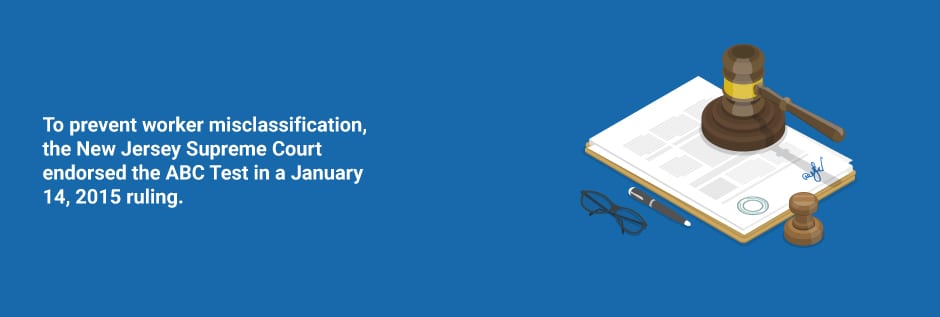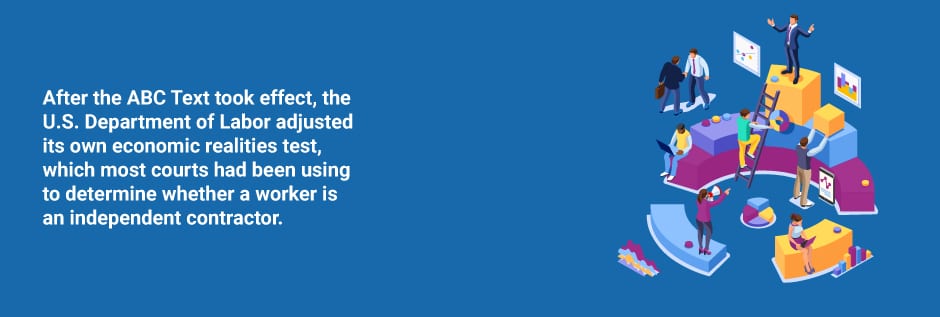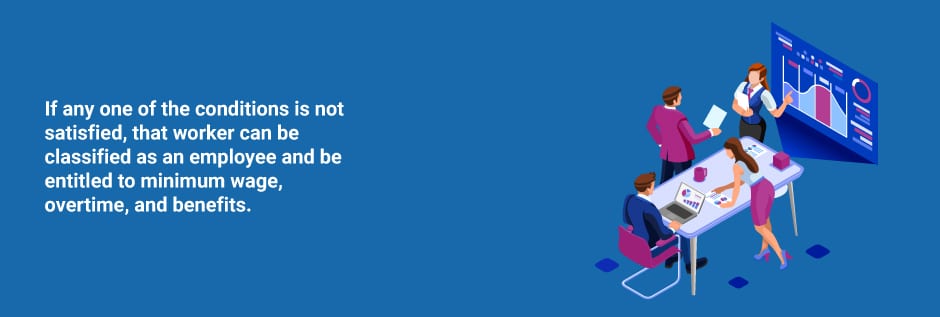There are several reasons why a New Jersey business might want to classify its workforce as independent contractors. Unlike employees, contractors are not entitled to health insurance, unemployment coverage, paid vacations, family leave, and other benefits that cost the company a significant amount of money. In addition, an employer can write off independent contractor fees as a business expense instead of including them in taxable wages.
On the other hand, misclassification deprives workers of the benefits they are entitled to. It also prevents the government from receiving workers compensation premiums and Social Security, unemployment, and disability payments. This is why the state government has adopted measures like the ABC Test.
Introduction of the ABC Test

To prevent worker misclassification, the New Jersey Supreme Court endorsed the ABC Test in a January 14, 2015 ruling. In Hargrove v. Sleepy’s, three drivers who delivered mattresses for the popular retailer claimed that their working conditions entitled them to be treated as employees even though they had signed an agreement designating them as independent contractors.
The court decided that when a dispute arises regarding a worker’s status, the New Jersey Unemployment Compensation Act will govern, even if the workers in question signed an agreement confirming their independent contractor status. The ABC test is derived from the Act and presumes that a New Jersey worker is an employee unless the employer can prove otherwise.
To demonstrate that the worker is actually an independent contractor, the employer must satisfy all three standards of the ABC test, which are explained below.
Standard A
The person was and will continue to operate without the employer’s control or direction over how they do their job. For example, they don’t answer to a supervisor, are not required to work within certain hours, or are not compensated based on their performance, with raises, etc.
Standard B
The service performed by the worker is not part of the company’s usual course of business (in other words, the worker’s output is not an advertised business service) or the work is conducted outside the business premises. A common example is a remote worker who uses their own computer, Internet connection, and other resources.
Standard C
The worker is normally engaged in an independent business or occupation. If they have other customers or clients in addition to the company, they would probably be classified as an independent contractor under this standard.
U.S. Government Guidelines

After the ABC Text took effect, the U.S. Department of Labor adjusted its own economic realities test, which most courts had been using to determine whether a worker is an independent contractor. It took the position that most workers are employees under the Fair Labor Standards Act and designed its test to determine whether the worker is dependent economically upon the employer or actually in business for themselves.
Classification criteria include:
- The extent to which a person’s work is essential to the employer’s business
- Whether the worker has an opportunity for gains or losses depending on their managerial ability
- The extent to which the worker and employer have invested in the relationship
- Whether the work requires initiative or special skills
- How permanent the relationship appears to be
- How much control the employer retains or exercises
Penalties for Misclassification

If you are a New Jersey business owner and state or federal authorities find that you have misclassified an employee as an independent contractor, you can incur substantial financial, legal, and even criminal penalties. For example:
- The state unemployment compensation law, family leave insurance law, and disability benefits law may hold you liable for past contributions that should have been made, plus interest and penalties
- You may be liable to the employee for not paying minimum wage or overtime for hours worked in excess of 40 hours per week
- You may be liable under the state wage payment law for making improper deductions from the person’s wages
If you use the services of independent contractors, you should assess your relationship with each one of them to ensure that it meets the three requirements of the ABC Test. If any one of the conditions is not satisfied, that worker can be classified as an employee and be entitled to minimum wage, overtime, and benefits.

Contact a Trusted Tax Law Attorney Today
Sometimes the line between employee and independent contractor can be a fine one, and you are either uncertain about how the law applies or have assumed the person to be a contractor in genuine error. If this happens, contact our New Jersey Tax Attorneys for a confidential case review. Attorney Brad Paladini will explain how the law applies to your workforce and help you take the right steps to ensure compliance.



